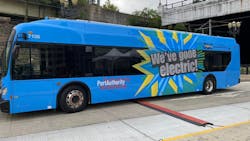Pittsburgh Regional Transit targets 2045 for zero-emissions bus fleet
Pittsburgh Regional Transit (PRT) will transition its 730-vehicle bus fleet to zero emissions by 2045 through a plan that will see an increase in diesel bus replacement in 2025 and an investment of $1 billion over the next 20 years to deliver on the transition plan.
Allegheny County Executive Rich Fitzgerald congratulated the PRT team for its “visionary approach to transit” and for “taking proactive steps” to improve operations, community health and the county.
“Over the [p]ast decade, whether at the county or in county agencies, we have focused on working collaboratively and strategically to reduce our impact on the community and environment. This announcement by Pittsburgh Regional Transit is the latest investment in a more sustainable county,” said County Executive Fitzgerald.
A full report on the transition plan will be presented to the PRT Board this month. PRT reports it anticipates investing $1 billion to transition to a zero-emissions fleet over the next 20 years. The agency will begin to increase its replacement of diesel buses with zero-emission buses beginning in 2025 and will only purchase zero-emission buses after 2032.
“We recognize our responsibility to move as quickly as possible to replace our fleet with zero-emission vehicles to improve the health, safety and welfare of the communities we serve," said PRT CEO Katharine Kelleman. "This investment in our system touches upon so many of the values that will propel our region toward a more equitable and sustainable future."
PRT says transitioning to a zero-emissions bus fleet will greatly improve the region's overall air quality while continuing to provide riders with reliable and efficient service. The American Lung Association’s State of the Air 2022 report card ranked Allegheny County with an F grade in both ozone and particle pollution but assigned it a passing annual particle pollution grade. The Breathe Project estimates 28 percent of Allegheny County’s pollution emissions comes from the transportation sector, which includes buses, as well as light-duty vehicles. PRT notes that a bus powered by a diesel engine is still better for the environment than personal vehicles but transitioning to a zero-emissions fleet will further reduce greenhouse gas emissions.
“In Allegheny County, emissions from vehicles, like buses, contribute to air pollution and the quality of air we breathe,” explained Allegheny County Health Department Director Dr. Debra Bogen. “We anticipate that PRT replacing its current buses with a zero-emission fleet will have a positive effect on the area’s air quality and health.”
PRT placed its first battery-electric buses into service in 2020 followed by an agreement with the Allegheny County Health Department to replace six 60-foot diesel buses with battery-electric buses and funding recently approved by PRT’s Board will see an additional 15 battery-electric buses for use on the future Downtown-Uptown-Oakland Bus Rapid Transit project.
PRT says its planned transition will allow it to evaluate developments with new technologies, including hydrogen fuel cell vehicles; enabling it to purchase the most advanced solutions, while also allowing time for its 1,400 bus operators and 800 mechanics to be trained and infrastructure upgrades required of the new fleet, including retrofitting its four bus garages and maintenance facility, to commence.
Non-revenue vehicles, charging infrastructure and facility upgrades required to support a zero-emissions fleet will be an additional cost. Federal funding is expected to be used to make up the difference in cost for the vehicles, employee training and charging infrastructure.
About the Author

Mischa Wanek-Libman
Group Editorial Director
Mischa Wanek-Libman is director of communications with Transdev North America. She has more than 20 years of experience working in the transportation industry covering construction projects, engineering challenges, transit and rail operations and best practices.
Wanek-Libman has held top editorial positions at freight rail and public transportation business-to-business publications including as editor-in-chief and editorial director of Mass Transit from 2018-2024. She has been recognized for editorial excellence through her individual work, as well as for collaborative content.
She is an active member of the American Public Transportation Association's Marketing and Communications Committee and served 14 years as a Board Observer on the National Railroad Construction and Maintenance Association (NRC) Board of Directors.
She is a graduate of Drake University in Des Moines, Iowa, where she earned a Bachelor of Arts degree in Journalism and Mass Communication.
